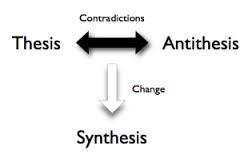
中文词源
dialectic 辩证的
来自dialect,交流,对话。引申为辩证的。
英语词源
- dialectic (n.)
- 1580s, earlier dialatik (late 14c.), from Old French dialectique (12c.), from Latin dialectica, from Greek dialektike (techne) "(art of) philosophical discussion or discourse," fem. of dialektikos "of conversation, discourse," from dialektos "discourse, conversation" (see dialect). Originally synonymous with logic; in modern philosophy refined by Kant, then by Hegel, who made it mean "process of resolving or merging contradictions in character." Related: Dialectics.
权威例句
- 1. Rather, he depended on America for one element of his dialectic.
- 毋宁说, 他靠美国支持他辩证观点中的一个因素.
- 2. Dialectic studies how opposites can become identical.
- 辩证法研究对立物是怎样变统一的.
- 3. He was a master of dialectic, could be even in the next sentence, stupidly dogmatic.
- 他是一个雄辩的大师, 但会在接下来的话中, 甚至变成愚蠢的教条主义.
- 4. This situation created the inner dialectic of American history.
- 这种情况造成了美国历史的内在矛盾.
- 5. And you don't have to apply historical dialectic materialism to daily life.
- 而且你不必把历史辩证唯物主义应用于日常生活.
